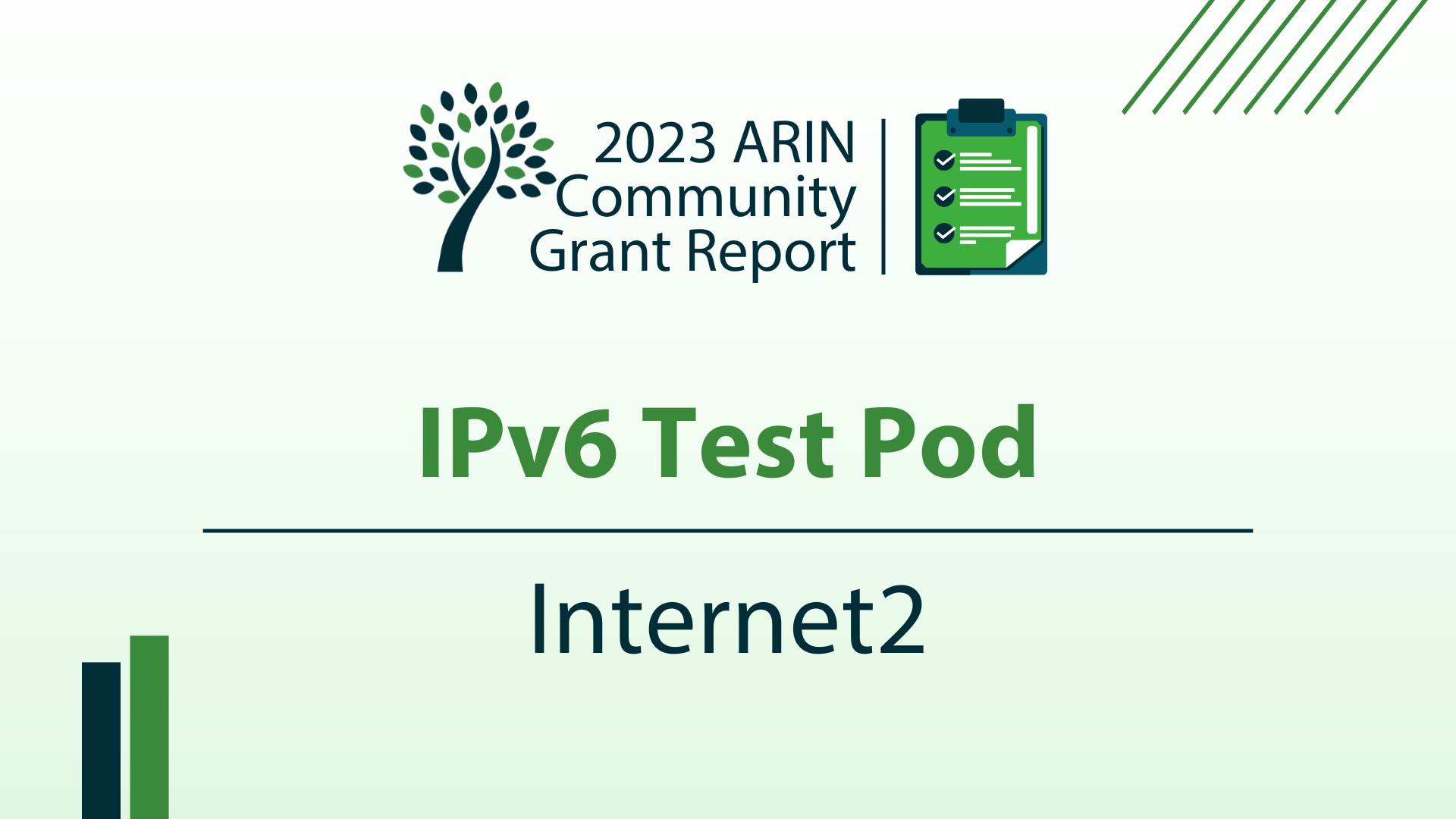
Grant Report: IPv6 Test Pod
2023 ARIN Community Grant Program Recipient Report
Internet2 received an ARIN Community Grant in 2023 to support its work providing a small, inexpensive Wi-Fi router and tunnel termination service to people for testing applications and services in IPv6-only networks or networks transitioning to IPv6-only. The project also aimed to gather and report feedback from participants on issues encountered and what further tooling may help in troubleshooting.
As world adoption of IPv6 continues, many applications are being tested and operated in dual-stack networks; however, dual stack is not a stopping point for IPv6 adoption. Work needs to begin testing applications and services in environments where IPv4 is being retired — these include networks that use DNS64/NAT64 to provide client access to IPv4 networks as well as networks that only have IPv6 access. Setting up these test networks can prove a challenging barrier for many, especially those without a networking background. This project’s objective was to lower the barrier to entry for testing applications on IPv6-only networks and networks using IPv6-only transition technology such as DNS64/NAT64.
Learn more about all the 2023 ARIN Community Grant Program Recipients.
Project Implementation
With this project, we set out to provide an environment to test IPv6 networks by sending out hardware at no cost to participants. With grant funds, we selected inexpensive hardware to provide Wi-Fi SSIDs demonstrating IPv6-only networks, 464XLAT, DNS64/NAT64, and “IPv6 Mostly.”
From an implementation perspective, developing a single inexpensive platform to handle multiple roles such as IPv6 tunneling, DNS64, and NAT64, in addition to DNS (without DNS64), proved to be more time-consuming than expected.
Initially the project intended to use AWS for IPv6 tunnel termination. After spending quite some time attempting to get an entire network range routed to a single Virtual Machine (EC2 Instance), we had to resort to hosting it on Internet2-provided servers. This turned out to be better for the project; it allowed us to spend more of the funds on hardware, which meant we were able to reach more project participants.
We sent 30 IPv6 test pods to participants in the U.S. Delivery to applicants outside the U.S. proved to be challenging from a legal and logistics perspective, so we opted to focus on those we could serve within the project timeline. We expected the largest portion of applicants to be from the Research and Education community, and this was the case. However, there was also significant interest from for-profit companies, government organizations, and individuals interested in experimentation, along with one ISP interested in IPv6-only networks. The operating system and software support for IPv6-only networks may not yet be ready for wide deployment, but there was considerable interest in testing it out and showing progress toward that goal.
Watch the recording or read the transcript of the IPv6 Test Pod project update James Harr presented at the ARIN 53 meeting to learn more, including background on the history and current status of IPv6.
Outcome and Impact
This project helped the 30 participants test software and applications on IPv6-only networks, demonstrate IPv6-only networks, and gain access to IPv6 where it otherwise may not be readily available.
For example, the targeted use cases hit home for one university system’s networking group that had been looking to develop an IPv6 lab to deploy IPv6 to a wider audience. This project provided them with an “easy button” for getting started, helping eliminate several initial hurdles to starting testing applications on IPv6.
You can view the project website at ipv6-pod.info and the project source code at gitlab.com/ipv6-test-pod.
What’s Next?
Hurdles to development of the pod and hosting of the tunnel termination delayed deployment such that only a small number of the participants had pods long enough to test and learn lessons, so this project was not able gather feedback on issues encountered. However, Internet2 will continue hosting the IPv6 tunneling service as long as possible and will follow up with participants over the coming months to collect their feedback. Additionally, more than half the participants intend to share their testing results with a larger audience in their organization or the public.
About the ARIN Community Grant Program
ARIN provides financial grants in support of initiatives that improve the overall Internet industry and Internet user environment. Are you working on a project that advances ARIN’s mission and broadly benefits the Internet community within the ARIN region through informational outreach, research, Internet technical improvements, or Registry processes and technology improvements? Visit the ARIN Community Grant Program page for more information and to find out how your organization can apply in 2025. For application tips and support, read this post on our blog.
Any views, positions, statements, or opinions of a guest blog post are those of the author alone and do not represent those of ARIN. ARIN does not guarantee the accuracy, completeness, or validity of any claims or statements, nor shall ARIN be liable for any representations, omissions, or errors contained in a guest blog post.
Recent blogs categorized under: Grant Program
GET THE LATEST!
Sign up to receive the latest news about ARIN and the most pressing issues facing the Internet community.
SIGN ME UP →Blog Categories
Updates • Outreach • Internet Governance • Grant Program • Tips • RPKI • IRR • IPv6 • Public Policy • Caribbean • Elections • ARIN Bits • Fellowship Program • Training • Security • Guest Post • Data Accuracy • Business Case for IPv6 • IPv4 • Customer Feedback


